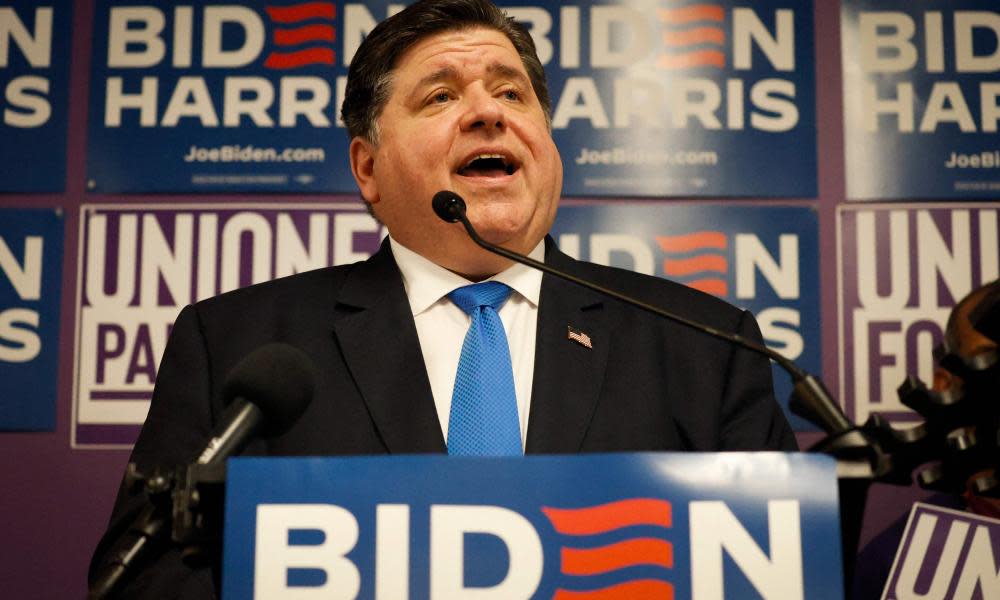Illinois governor ‘deeply concerned’ by Trump rhetoric reminiscent of Nazi era

Donald Trump’s rhetoric on immigration, his plans for a second presidency if he wins next year’s election, and his description of political enemies as “vermin” reflect the language of 1930s Germany and the Nazis’ rise to power there, a senior Democrat warned on Sunday.
JB Pritzker, the Illinois governor of Jewish descent who helped drive the construction of the state’s Holocaust Museum and Education Center in Chicago, added his voice to a wave of condemnation over the former president’s remarks.
Joe Biden last week also likened Trump’s comments to the era when Nazi Germany orchestrated the murders of 6 million Jews during the Holocaust, saying “it isn’t even the first time” he had done so.
Trump had deliberately chosen to use words “that are unfortunately reminiscent of the past”, Pritzker said during an appearance on MSNBC’s Inside with Jen Psaki.
“The rhetoric that’s being used by Trump, by some of the Maga (Make America great again) extremists, is rhetoric that was used in the 1930s in Germany [and] I am very concerned about the direction of the country if we see policies like what Donald Trump is espousing come to light,” he said.
“In Germany in the 1930s people that they didn’t want to have power, people that they wanted to separate and segregate, they began calling them immigrants, even people who had been in Germany for generations. This is a way to begin to segregate people and then eventually … dehumanize and kill people.
“I don’t know where it’s going with Donald Trump. What I can tell you is that the things that he talks about are frightening to those of us who know the history of Europe in the 1930s and 40s. And I’m deeply concerned about his predilection for revenge and what that will mean for groups of people that didn’t support him in the 2024 election if he gets elected.”
Highlighting Trump’s extremism has become a key part of messaging from the Joe Biden White House and Democratic party as the runaway leader in the race for the 2024 Republican presidential nomination moves further ahead of his challengers.
“Employing words like ‘vermin’ to describe anyone who makes use of their basic right to criticize the government echoes dictators like [Adolf] Hitler and [Benito] Mussolini,” White House spokesperson Andrew Bates said during a press briefing last week.
“Using terms like that about dissent would be unrecognizable to our founders, but horrifyingly recognisable to American veterans who put on their country’s uniform in the 1940s” and defeated the Axis Powers which included forces from Hitler’s Germany and Mussolini’s Italy during the second world war.
Pritzker expanded on the theme Sunday in his interview with Psaki, Biden’s former White House press secretary.
“I repeat it wherever I go, that Donald Trump is dangerous for our democracy. He’s dangerous for specific minority groups in the US. And I think that for those of us who have a platform to call it out it is a requirement,” he said.
“I’m deeply concerned about the rise of hate. I worry about it on our college campuses. We’ve seen protests, and I think it’s everybody’s right to express themselves. What I don’t want is protests and counter-protests encountering each other and that turning into violence.”
The governor also had words of comfort for Democrats concerned at recent polls placing Trump ahead of Biden in several key swing states.
“I don’t think yet people have really put these two next to each other and evaluated what the philosophies and agendas are,” he said.
“People don’t really focus until, let’s face it, after the conventions. It’s just in those final couple of months, July all the way through November, that this needs to be brought home to people.
“When that happens, that crystallization will occur in people’s minds and people will see that the democracy that they believe in, the country that they owe their allegiance to, that the best thing for America is to put aside the authoritarian Donald Trump.”
Trump was in Texas near the border with Mexico on Sunday to promote an escalation of hard-line immigration policies that he adopted while in office.
Those policies alarmed civil rights activists and drew court challenges.
